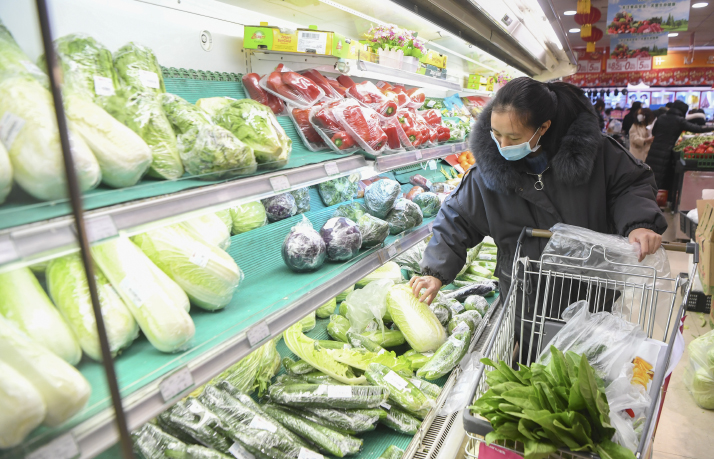| Lifestyle |
| People Before Profits | |
| A foreigner living in China shares her experience during the novel coronavirus outbreak | |
|
|
 A customer selects vegetables at a supermarket in Chongqing, southwest China, on February 5 (XINHUA)
Even though several Chinese friends and colleagues stayed in steady contact with me, keeping me up to date on developments, the headlines about the virus' spread and ensuing panic were taking their toll on me. By the time I was ready to leave for Beijing, I was sure it was a big mistake. My airline posted mixed messages about whether I would be quarantined, detained or refused boarding. I arrived at the airport expecting the worst, but was able to board my flight and make it to Beijing with no problems, only being stopped to have my temperature taken. Upon arrival in China's capital, medical personnel boarded and inspected the plane before we were let off. With hardly any cars on the road, I got to centrally located Xicheng District in record time. At the gate of my apartment complex, two people who identified themselves as community workers asked me to sign in and specify where I had been, particularly if I had been to Wuhan, Hubei Province in central China, where the virus first appeared, which I had not. They took my temperature, asked me how I felt and told me to let them know if I needed anything. I appreciated the concern. I already knew the Chinese Government had asked people to stay home, avoid going out unless necessary, wear a face mask while out and wash hands regularly. Without knowing what to expect, I ventured out to the supermarket, where the usual Saturday bustle was eerily absent. There was plenty of fresh produce and meat, as well as other foodstuffs and paper goods. Nothing was in short supply and prices were about the same as always. Chinese people at the store were friendly and orderly; there was no mad rush to hoard. It was then that I started to relax. All the news I had heard while out of the country was proving to be false. The government had extended the Spring Festival holiday and urged all companies that could to have their employees work from home. That included me, so I settled into a routine of working, watching the news, cooking, eating, napping, exercising and staying in touch with folks. I went out every couple of days to get supplies and every time, there were more people on the street, not normal levels by any stretch, but more. Neighbors greeted me and asked me how I was doing, and an unexpected snowfall made Beijing especially beautiful. While I was away, China had begun construction on two hospitals in Wuhan which were finished the week I returned. How was this even possible? President Xi Jinping had said the priority was people's life and wellbeing, and I was beginning to see it. China is able to pull the country's resources together to focus on a problem because socialism with Chinese characteristics can work miracles. For example, a large portion of medical expenses is being waived as an encouragement for people to seek treatment. As of February 6, about $9.5 billion had been allocated for epidemic prevention and control. The production of face masks and other protective medical supplies is being streamlined and carried out around the clock. Private and public hospitals, hotels and other places in Hubei are being used to quarantine and treat infected patients. The dispatch of medical workers from all parts of China is being well-coordinated. The government has even waived payments on mortgages and loans while people are not working. It prohibited airlines and railways from charging customers fees for changes and cancellations and announced severe punishment for anyone caught price gouging or hoarding. I lived in the U.S. through the AIDS pandemic in the 1980s. The Ronald Reagan administration ignored the crisis for years and stigmatized the victims of the deadly disease instead of helping them. Once pharmaceuticals made medications available years later, their costs still condemned most to death. The stampede toward profits painted a tragic picture. In New York City, where I lived, major snowstorms easily pushed gas and food prices up to exorbitant levels. Every winter, people died in the cold because they could not afford to pay for heat, while thousands, mostly the sick and elderly, died from the common flu. But in China, the effective, swift and compassionate battle against the virus has served as a calming balm for me. I have readily put my trust in the Chinese Government knowing that it is putting people before profits. The author is a Costa Rican living in China Copyedited by Madhusudan Chaubey Comments to dingying@bjreview.com |
|
||||||||||||||||||||||||||||
|